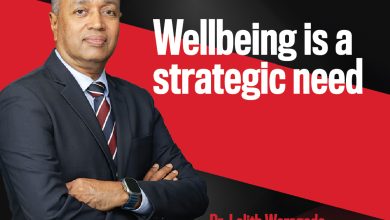BUSINESS EXPANSION
Catalysts for growth
Charitha Subasinghe

As Charitha Subasinghe points out, the challenges of the recent years – e.g. COVID-19 and the economic crisis – have prompted varied responses from businesses; some have battened down the hatches while others have forged ahead, looking for new opportunities.
However, he believes that this strategy is not sustainable and can lead to a vicious cycle of contraction and nonviability: “The primary reason is that businesses risk becoming irrelevant to stakeholders including customers, team members, shareholders and the community.”
Subasinghe reiterates that even during the worst times, a business must look to grow – and this can come in various forms and shapes. Whatever the growth strategy, this is absolutely crucial, he maintains.
Therefore, he views growth and expansion as essential to business survival and success.
ECONOMIC PROJECTIONS Historically, there have been deviations between forecast and actual economic outcomes; and as Subasinghe observes, economic forecasting models have yet to be updated for the new norms the world has embraced.
As such, deciding on expansion initiatives purely based on projections could be counterproductive: “There will be chaos and incomplete information for decision making. Businesses need to try different options, pay attention to responses and adapt accordingly.”
If a strategy leads to positive responses, resources and strategies should be strengthened. In contrast, Subasinghe notes that if the responses are negative, the strategy should be promptly abandoned.
These are interesting times for running organisations; and having a results focussed and agile mindset is crucial, he adds.
EXPLORING GROWTH Growing a business starts with knowing your customers and stakeholders.
During an economic downturn, customers’ lifestyles may change due to affordability issues but their wants and needs remain unchanged. Providing them with solutions to their wants and needs can enable a business to grow market share and long-term loyalty.
Having observed responses from some brands in Sri Lanka in recent months, Subasinghe says it is clear that those who proactively addressed these needs have done well while others alienated themselves from loyal customers.
The risk of going into hibernation mode and cutting costs to survive can lead to a dilution of core strengths, he explains. For example, if a business’ core strengths include service and quality, cost cutting could negatively impact these elements.
“Businesses must look to enhance their core strengths and use them as tools to grow the market. If sustained and enhanced, corporates could penetrate markets and increase market share,” he elaborates.
Subasinghe feels that “going global comes with its own set of challenges so before pursuing offshore expansion, a business should first exhaust all other growth opportunities in its current market. It is crucial that the organisation does not dilute its core strengths.”
Additionally, he believes that there may be opportunities to move into adjacent businesses using organisational strengths. While the ensuing incremental sales may not be substantial, sharing already used assets would enable an organisation to garner incremental profits.
TALENT SHORTAGE Subasinghe insists that the talent shortage was always a brewing topic due to various issues – even before the economic crisis unfolded.
Breaking this down, he notes: “An archaic education system not relevant to current market conditions, organisations not having clear visions to develop and manage their talent pipelines, and a lack of relevant incentives to retain talent are some reasons for this shortage.”
“In most cases, short-term, ad hoc actions enabled organisations to horse trade and acquire the talent they needed,” he adds.
The economic meltdown has exacerbated this issue, leading to talent seeking greener pastures. He notes that organisations must take control of situations by identifying the human resources required to implement their strategies and plans effectively.
And Subasinghe asserts that establishing HR policies and execution frameworks to recruit for attitude and then skills, and develop according to the organisation’s requirements, is essential.
Charitha Subasinghe is the President of Retail of John Keells Holdings.





